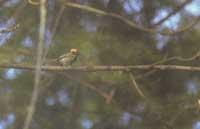Sancho the Cecilia: the younger king

Sancho VII el Fuerte, XVI. The king was a man over two meters high. It is possible that these types of sizes are also unusual among kings, but is it not strange that the smallest bird in all of Europe is known as "the king"?
Maybe some of you believe that the smallest was the txepetxa, but the weight of the saying can be half that of the txepetxa, 5 grams, and its length does not exceed 8-9 cm. Therefore, this Txoritxo, of honorary name, has in his head a beautiful golden crown, but being so small, can not be called king and called regato.

Considering its size, it will not be very difficult to know this paseriforme. But to know it you have to see it and for the same reason, this second is not so easy. Being so small, many times we would not realize that it is around, if not for this song: "tsi-tsi-tsi-tsi-tsi". Therefore, this repetitive call can help us find the bird. Once we have that tiny thing in sight, we will realize that it does not stand for half a second.
Alternating short flights, it circulates continuously through the branches of the trees, without paying much attention to man. Therefore, sometimes it offers us the possibility to see it from a certain proximity and in them we can acquire their clothes. The male has on his back a green vestibule at the height of the kings. In the pileo (at the top of the head), the crest or crown of orange color surrounded by black remains. Also noteworthy are the two yellow sides of the neck, the white eyebrow and the black line of the eye.
It is precisely in these colours around the eyes that our cejudo horn (Regulus ignicapillus) is best separated from our mountain grill (Regulus regulus regulus), which has a crest surrounded by black, but has no other trace. In addition, each species produces an easily separable edge.
The female has a similar coloration, but the color of the crown is yellow. Finally, young people do not have crowns and the color of the body and the traces of the eye is less intense.
The cejudo kingdom is a kind of forest and wooded. Despite his love for conifers, Kegun is also found in beech, holm oaks and other forests and scrubland. He also likes trees in the parks and gardens of Herri handi. On the other hand, from the plains and valleys you can climb up to 1,600 meters on the mountain.

Like the Kings of Navarre in ancient times, the Regachos also go hunting with the Court; and the Court is composed in most cases by chargers, txiios and waist birds. Therefore, these social animals are seen in family groups and usually with unrest, at least outside the reproductive age. Just as hunting shakes are made for catching game pieces, all participants begin to explore every corner of the forest. However, to avoid competition. each specializes in certain types of hunting and in certain areas of the trees.
Being the lightest, the little ones go to the finer branches of the trees and, despite their weak appearance, show great skill in hunting bugs. However, the maintenance of homeothermia (body temperature) in such a small body is a great energy expense that you must hunt to survive. By means of a sharp beak, they usually capture insects, spiders and small invertebrates in general.
In spring it is time to marry a beautiful white brow Queen. To do this, the male has to leave the company and conquer a territory, if a member of the species approaches the area, lifts the elegant crown and goes out against those who have entered the territory as if they burned his head. Lifting the golden crown, she also tries to impress and attract the female in her bridal games.
7-11 Princes or Princesses are born from egg white in a soft and rich nest. The nest, however, is perfectly confined between the leaves of conifers, buttocks or ivy. In addition, in order to avoid heat loss, in the construction of mosses, herbs and spiders, parents place plumes throughout the environment. The life of the little ones, however, is very hard, especially when they leave the nest two weeks. As mortality is high, to ensure the succession of the monarchy they are usually cured twice a year.

The Kingdom of the White Viceroy extends from Mediterranean Europe to the southern Baltic, as well as to some regions of Africa, Asia and America. In the humid green we can find it everywhere, but to the south only in the mountain area. It is common in Euskal Herria, except on the Mediterranean side. The cleared lands of the Ebro and some northern region are the only ones that have not dominated.
The pine plantations of Bizkaia and Gipuzkoa seem to have benefited the species, being one of the most common birds. This division is very different from that of the mountain race, which is only grown in our country in forests of pyrenean conifers. As for the distribution on the European continent, however, the mountain regato is much more widespread than that of the white eyebrow.
The refractories of our region can pass all seasons of the year without moving. But Northern European species have to go south to survive in difficult times. Therefore, in Euskal Herria we can find migrants and sedentary people in winter. That's why and the fact that many trees are still naked, the current is a good time to try to find the white viceroy chones. Attention therefore and see if you meet this dwarf next time, because they are the smallest, but as the name suggests, they are of great prestige.
Technical information White eyebrow hook Species: Regulus ignicapillusFamily: |





